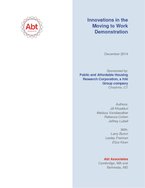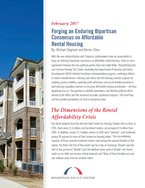0
Publication
Community:
Dec 5, 2018
The Tax Cuts and Jobs Act of 2017 provides a new incentive—centered around the deferral, reduction, and elimination of capital gains taxes—to spur private investments in low-income areas designated by states as Opportunity Zones. This provision is based heavily on the Investing in Opportunity Act (S. 1639) introduced by Senator Cory Booker (D-NJ) and Senator Tim Scott (R-SC). Given the significant interest among investors, it is possible that this new tax incentive could attract hundreds of billions of dollars in private capital, making this one of the largest economic development initiatives in U.S. history.
Authored by: Bruce Katz and Ken Gross
Topics: Community development, Funding, Legislation & Policy, Mobility, Place-based
 Shared by Mica O'Brien
Shared by Mica O'Brien
Mica O'Brien posted a
on Dec 5, 2018
The Tax Cuts and Jobs Act of 2017 provides a new incentive—centered around the deferral, reduction, and elimination of capital gains taxes—to spur private investments in low-income areas designated by states as Opportunity Zones.
0
Policy Brief
Community:
Nov 29, 2018
The Department of Housing and Urban Development (HUD) is giving state and local housing agencies more funds to help them carry out a promising new policy to enable families with Housing Choice Vouchers to move to higher-opportunity neighborhoods. Agencies must apply by December 31 to receive the funds.
Authored by: Will Fischer for The Center on Budget and Policy Priorities
Topics: Child welfare, Funding, Housing, Legislation & Policy, Low-income, Mobility
 Shared by Mica O'Brien
Shared by Mica O'Brien
Mica O'Brien posted a
on Nov 29, 2018
Will Fischer for The Center on Budget and Policy Priorities
The Department of Housing and Urban Development (HUD) is giving state and local housing agencies more funds to help them carry out a promising new policy to enable families with Housing Choice Vouchers to move to higher-opportunity neighborhoods.
0
Report
Community:
Jul 20, 2018
This report catalogues and describes the MTW innovations that participating PHAs and the study team consider most important and far-reaching in their effect on residents, the agency, and the local community. The report is largely descriptive and does not attempt to measure the results of the innovations undertaken by MTW PHAs. However, it does classify the innovations, discuss their significance, and explain how they make use of the flexibility afforded by MTW.
Authored by:
Topics: Cost effectiveness, Funding, Housing, Mobility, MTW
 Shared by Housing Is
Shared by Housing Is
Housing Is posted a
on Jul 20, 2018
This report catalogues and describes the MTW innovations that participating PHAs and the study team consider most important and far-reaching in their effect on residents, the agency, and the local community.
0
Publication
Community:
Jul 12, 2018
With the new administration and Congress, policymakers have an opportunity to forge an enduring bipartisan consensus on affordable rental housing. There is more agreement between the two political parties than one might think: Strengthening the Low-Income Housing Tax Credit, expanding the Department of Housing and Urban Development (HUD)’s Rental Assistance Demonstration program, continuing efforts to reduce homelessness, infusing real choice into the housing voucher program by enabling greater mobility, expanding self-sufficiency and asset-building incentives, and reducing regulatory barriers to increase affordable housing production—all have bipartisan buy-in. The question is whether lawmakers can find the political will to devote to the effort and the resources to make significant progress. This brief lays out the possible parameters of such a consensus plan.
Authored by:
Topics: Dual-generation, Funding, Homelessness, Housing, Legislation & Policy, Low-income, Mobility, RAD, Research
 Shared by Housing Is
Shared by Housing Is
Housing Is posted a
on Jul 12, 2018
With the new administration and Congress, policymakers have an opportunity to forge an enduring bipartisan consensus on affordable rental housing.
0
News Article
Community:
Dec 9, 2017
Agency walks line of potential conflicts in seeking more private money
Authored by: Sue Reinert for Cambridge Day
Topics: Cost effectiveness, East Coast, Funding, Housing, Low-income, Mobility, RAD, Stability, Youth
 Shared by Housing Is
Shared by Housing Is
Housing Is posted a
on Jul 5, 2018
Sue Reinert for Cambridge Day
Agency walks line of potential conflicts in seeking more private money
0
Report
Community:
Nov 1, 2017
Why do some neighborhoods appear able to launch effective local improvement initiatives, while others are more hampered by fragmentation and mistrust? Why can some communities mobilize diverse constituencies to influence public policy, while others cannot? Answers to these questions may be found in the specific patterns of collaboration that form among community organizations, and between these groups, schools, public agencies, and elected officials, according to MDRC, a preeminent social-policy research organization.
Authored by: MDRC
Topics: Asset building, Child welfare, Community development, Data sharing, Dual-generation, Education, Family engagement, Funding, Health, Housing, Legislation & Policy, Low-income, Metrics, Midwest, Mobility, Out-of-school time, Partnerships, Place-based, Preventative care, Research, Safety, Stability, Workforce development, Youth
 Shared by Mica O'Brien
Shared by Mica O'Brien
Mica O'Brien posted a
on Jun 29, 2018
Why do some neighborhoods appear able to launch effective local improvement initiatives, while others are more hampered by fragmentation and mistrust? Why can some communities mobilize diverse constituencies to influence public policy, while others cannot?
 Shared by Housing Is
on Jul 20, 2018
Shared by Housing Is
on Jul 20, 2018
 Shared by Housing Is
on Jul 12, 2018
Shared by Housing Is
on Jul 12, 2018
 Shared by Housing Is
on Jul 5, 2018
Shared by Housing Is
on Jul 5, 2018







